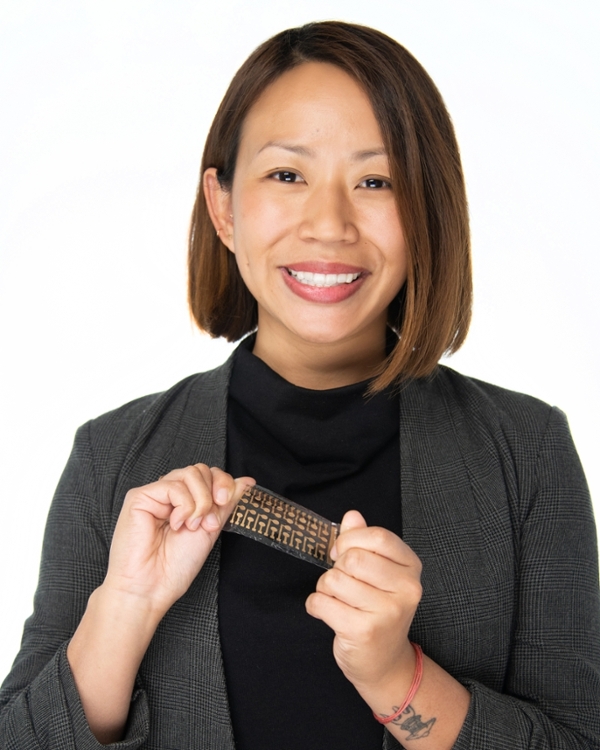Molecular Design and Advancing Technology
Meet Helen Tran

Helen Tran, Ph.D., developed new technology with unique characteristics as part of the Intelligence Community Postdoctoral Research Fellowship Program. (Photo Credit: Helen Tran)
Art and creativity can often be found in the most unusual places. Though some people might not consider science and engineering to be creative, both fields involve elements of imagination, ingenuity and creativity. Helen Tran, Ph.D., channels her artistic creativity through molecular design and chemistry.
Molecular design involves the development of molecular models, which are used to mimic the behavior of molecules for the purposes of testing hypotheses. Molecular models help scientists understand chemical, biological and compositional properties of inorganic, biological and polymeric systems. Tran, who discovered her passion for science in college, uses molecular design to create new materials and experiment with different properties. She was initially drawn to the field after recognizing its creative and artistic potential.
“I fell in love with organic chemistry, which was a beautiful mix of molecular design and tangible construction of new materials with atomic precision,” said Tran. “It is important to understand which building blocks to use and which synthetic techniques are needed for chemical transformations. In the end, you make molecules that nobody else has ever made.”
Recently, Tran applied her knowledge of chemistry and molecular design to developing new technology as part of the Intelligence Community Postdoctoral Research Fellowship Program (IC Postdoc Program).
The IC Postdoc Program is administered by the Oak Ridge Institute for Science and Education (ORISE). The program offers scientists and engineers from a wide variety of disciplines unique opportunities to conduct research relevant to the Intelligence Community. For her fellowship, Tran developed nontraditional electronics as part of the research group led by Professor Zhenan Bao, Ph.D., at Stanford University. Her IC Postdoc Program adviser was Brian Holmes, Ph.D., dean of the School of Science and Technology Intelligence at the National Intelligence University in Bethesda, Maryland.
Tran’s research focused on making electronics more stretchable and biodegradable. Although traditional electronics are typically rigid and robust, adding components like stretchability and degradability opens doors to a vast array of applications.
“Imagine electronics that are as thin as tattoos on skin or as disposable as stickers,” said Tran, describing potential directions of her research. “The realization of these next generation electronics critically hinges on the development of new materials with functional properties, understanding of processing and advances in device fabrication.”
Alongside a team of collaborators, Tran designed on a molecular level a two-component system that self-assembled into a fiber-like morphology important for achieving each of the three functionalities: performance, stretchability and biodegradability. The resulting material was used to fabricate biocompatible and degradable field-effect transistors, which use an electric field to control the flow of current. Tran’s research holds significant potential for the medical community.
“By imparting stretchability, we can better interface electronics with our dynamic body and other structures,” Tran explained. “Moreover, by imparting degradability, we can think about applications where it is difficult to retrieve the device, such as inside our body.”
The three years Tran spent as an IC fellow provided her many valuable opportunities. She attended conferences and presented her research, networked with other professionals and built scientific relationships with the international community. Tran also strengthened her professional writing skills and contributed to 13 articles published in various scientific journals.
“I feel fortunate to have been selected for the Intelligence Community Postdoctoral Research Fellowship,” said Tran. “I have grown as a teacher, mentor, researcher and communicator. I learned a lot about the government research infrastructure and was exposed to many new sectors of research during my fellowship. I gained insight into government agencies, developed an auxiliary mentorship with Dr. Brian Holmes and formed lifelong friendships.”
In November 2019, Tran was selected for the first class of IF/THEN ambassadors for the American Association for the Advancement of Science (AAAS). As an ambassador, Tran provides mentoring to young girls interested in science, technology, engineering and mathematics (STEM) fields. Only 125 women nationwide were selected for the program.
In May 2020, Tran’s research in polymers and stretchable electronics was featured in the CBS show “Mission Unstoppable,” an educational series that spotlights women in STEM careers.
Following completion of her IC Fellowship, Tran will begin working as an assistant professor at the University of Toronto in the Department of Chemistry, cross-appointed in the Department of Chemical Engineering and Applied Sciences.
The Intelligence Community Postdoctoral Research Fellowship Program is administered by the Oak Ridge Institute for Science and Education (ORISE) under an agreement between the Office of the Director of National Intelligence (ODNI) and the U.S. Department of Energy (DOE). ORISE is managed for DOE by ORAU.

